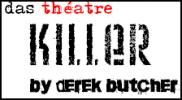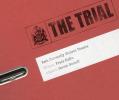Drama Reviews 2007
KAEBIDE THEATRE - Low Level Panic

Low Level Panic is the story of three, flat-sharing female friends. Jo shares her thoughts on men, her sexual fantasies and her body with her friends and the audience; Mary, recovering from the psychological scars of a recent sexual assault is becoming increasingly introverted, while Celia is the most assertive, amiably putting down her friends and contributing to their lack of self-esteem.
The play takes a long look at modern women and their self-image, and how it is coloured both by men (particularly men who use pornography) as well as how women sometimes collude with the stereotypes that the world presents them with.
Debbie Harlow as Jo gives the most nuanced performance of the three - in many respects her character has the best lines and is the most developed in the script - and she rises to the challenge. The other characters are not so clearly defined: Katie Fullard as Mary is effective in the flashback to the assault, but seemed less comfortable at other times, while Laura McKeating as Celia was suitably strident and fixated on the superficial, and her attack on Jo for messing up the bathroom worked well.
The programme describes Low Level Panic as 'fast becoming a modern feminist classic' which might be a slight overstatement. While there is much food for thought here on gender issues, I didn't feel there was much new in what it had to say. That said, it raises issues that still need raising and was produced with integrity and commitment.
Robbie Carnegie
Das Théatre - Killer

Powerful stuff as Steve Hanna confronts and assaults the audience by his presence and physically stern and lashing tongue. Really, really confrontational. The writer, Derek Butcher forces us to consider the possibility that we all have the power to be killers, but it is up to us how we use that power. If at all.
In a series of heart-rending monologues peppered by good use of mood music and striking visuals, the story is told of a death and how close we are to it.
What does death do to us? Does it calm us? Does it make us look beautiful - do we become the angels of death? Or do we simply desist? And what of the process that takes us there: is death something that truly brings some people to life?
The speed-fuelled rantings and justification for action make psycho-killing into Irvine Welsh poetry fit for a street King. He challenges us: "what are you afraid of? Is it darkness or terror or is it the horror that lurks inside us all as we realise we are all potential killers."
We are all present for at least one death, prepare for it. Bigmouth strikes again and challenges the audience to think about this: when you smash a person's brains in, you'd better make sure you're prepared for what comes out.
Corridor Theatre Co. - Derbyshire Roots

It is remarkable to think that 2 people could single-handedly produce as much quality material as Peter and Tracy Dawson have done to create a fantastic stage show, capable of entertaining any audience. Poems, singing and acting are all part of this wonderful performance, which encapsulated its audience on Friday evening.
Peter Dawson entertained the crowd with his beautifully written poems, which ranged from personal experience to clever imagination and also cheerfully engaged the audience in between poems to give the reading a constant, lively flow. When the audience were asked to participate in the readings by chanting the chorus of 'Bandit Land', they did so with genuine enthusiasm and enjoyment.
Tracy Dawson produced a fine performance as Dora Mary Ferguson, creating true emotion within the audience, from laughter to sadness. Rarely has one woman sat on a bench been so entertaining. Her costume, props and convincing acting all contributed to the brilliance of this piece that left her viewers wanting more. Brilliantly written and wonderfully performed, comparisons with Victoria Wood would do Tracy Dawson no injustice on the evidence of this sketch.
Tracy continued to draw emotions from the crowd with her portrayal of Mary Magdalene in A Sinful Nature, which produced one of the most moving moments of the whole evening thanks to Tracy's superb and convincing performance. This short sketch is capable of evoking emotion from people of all ages.
The evening certainly did not end with an anticlimax as the performance was rounded off by another poetry recital by Peter Dawson. The variety in his poems is quite remarkable and his ability to connect with the audience seems effortless.
Fittingly, the show was rounded off by a poem read by both performers of this delightful roller coaster of laughs and tears. Playing the parts of a sailor and his wife, Peter and Tracy Dawson surprised their audience by displaying their fine singing voices in a tear-jerking climax, which deservedly left the audience applauding.
Truly this show is suitable for anybody who enjoys intelligent writings and thoughtful characterisation. With their well-crafted scripts and genuine enthusiasm in their work there is nothing to stop Peter and Tracy Dawson from headlining venues across the country.
Craig Taylor
Das Théatre - Penetrator

A dark comedy from 1993 updated to 2007. Hmm, dark certainly.
There has been a lot of sex and violence in the Fringe this year. No I don't mean the committee, I can't speak for the performers. Some of it has been comic, some thoughtful, some despairing. There is a connection between sex and violence, penetration is at root a violent act. The underworlds of pornography and our secret sexual fantasies are unsettling places. It is important that theatre explores them. But theatre can be exploitative too. It is possible to use sex/violence as a shock tactic for valid reasons. It is also possible to exploit it and the audience in invalid ways. It can be lazy drama, shock for the sake of it, following the fashion.
I am unsure of the relevance of the opening of this play to the plot. Shocking, disgusting, very well done but... valid? I don't know. Was it in the original? Is this what updates this to 2007?
The core themes of the play are repressed homosexuality and personality damaged in childhood. The two combine in Tadge to create fulminating madness that erupts into irrational violence. I can see comic possibilities here but this wasn't played for and I think the opening may have set the audience in a mood that was unresponsive to the comic possibilities. It might have been subtler to play the comedy and allow the violence to be more of a counterpoint. As it was I felt rather bludgeoned. Much of the violence was frenetic rather than coldly menacing which I always feel is the more affecting type. Maybe I'm just an old-fashioned Hitchcock fan.
The actors are all very good. Seeing Tadge in the bar afterwards was quite unsettling, which is always a good sign. I'm less sure about the direction.
John Wilson
Soapbox Theatre Company - The Dumb Waiter by Harold Pinter

Pinter without the pauses! What next Cage without the silences? This is an interesting experiment.
Soapbox modestly bill this as an amateur production. We wouldn't have known. Both actors were excellent.
The Dumb Waiter is Pinter meets Becket. Godot/Wilson (no relation) never arrives, but there is a conclusion to follow the tension and comedy of the interplay between Ben and Gus (Joe Ransom and Paul Denney respectively).
There are silences in the play but not pauses and this is interesting. The silences are those of the writing, we never hear Wilson's voice, Ben is irritated by Gus' constant questions and tries to avoid answering. But there are no long pregnant pauses introduced by the actors. In Pinter these are sometimes significant and useful to the audience but I have to say I didn't miss them in this performance.
I have one small caveat: I found the end confusing. I don't want to give the ending away but I'm not a big fan of unnecessary obfuscation in the theatre. That aside, Soapbox are to be congratulated. Welcome to Buxton!
Performances are in the Pauper's Pit on the 20th and 21st and last 45 minutes. What do you think of that Harold?
John Wilson
The Young Rec Theatre Company - Godspell

In the early 1970s, two similarly themed musicals broke onto the world stage, Jesus Christ Superstar and Godspell. However, while Rice and Lloyd Webber's work concentrated more on Jesus the man, beset by doubts and insecurities, Stephen Schwartz's Godspell is based more around Jesus the teacher, spending most of its running time dramatising the Parables, before briskly moving through his betrayal and crucifixion.
I would have to say that Superstar has stood the test of time better. Godspell is very much a creature of its age, with a hippy, 'let's put on a show right here' quality. As such it sometimes seems a bit arch when performed by seasoned adult performers (in the original production David Essex's Christ wore dungarees and clown face - a scary idea to modern sensibilities).
By the same token, however, its very naivete makes it ideally suited for performance by a company of young performers - the cynicism of age isn't present, and enthusiasm and goodwill radiate from The Young Rec Theatre Company.
I have to congratulate Ollie Savile, who plays Jesus with enormous authority and assurance, his strong voice displaying none of the problems which apparently had beset him earlier in the week. Otherwise, it is very much an ensemble piece - the programme doesn't single people out and I intend to follow that lead. There were many very pleasant voices amongst the cast and all approached the piece with energy and conviction. In a show which largely consists of one person telling a story and the rest of the cast listening and reacting, this is essential. It wasn't over choreographed, but those songs that contained simple steps were slick and worked very well.
The band under the assured direction of Laura Monaghan, were extremely good and provided a positive grounding for the show. St John's is a good venue in terms of size and feel, but it's acoustic, so well suited to unplugged instruments and voices occasionally struggled with amplified voices (particularly the lower ones) and sometimes the diction was lost. This didn't hamper enjoyment of the show, however.
Having seen this show, and the Community School's Blood Wedding and Midsummer Night's Dream during the Fringe, I have been heartened by the wealth of accomplished young performers in Buxton at present. A month or so ago Simon Cowell et al were telling us 'Britain's Got Talent' - the jury's still out on that one. But, on the evidence of these shows, it's pleasing to know that Buxton's got talent.
Robbie Carnegie
Trace Theatre - Cringe

We've all been to a dinner party where everyone's getting along fine, the stories are flowing, the psychological insights are being shared, and then there's a silence, an embarrassing silence where all those present fill the discomfort with their own thoughts.
It's those lacunae that seem to be being illustrated in Cringe. The performers (Nicki Hobday, Jodean Sumner, Carl Robinson, Steve Clarke and Craig Pullen) give performances which serve the piece well, alternating between extremely naturalistic, almost improvisational, monologues and slickly choreographed chorus work. Genders are swapped, characters morph, the actors leave themselves naked and exposed (in two cases literally so). There's a flagrant flouting of a loophole in the smoking ban with (I think) seven cigarettes smoked at once by three people (I lost count) and a rather alarming near drowning exhibiting great breath control from both the victim and the perpetrator.
Of course, I could be completely wrong in what I think Cringe is 'about'. Maybe it's prosaic to even try and interpret it too literally. I'm sure the company will forgive me if my attempt to do so has failed. Playfully mystifying though Cringe sometimes is, it is always extremely watchable, always intellectually challenging, always physically brave and never outstays its welcome.
Robbie Carnegie
Black Box Theatre Company - Yesterday

Wake up Buxton! I saw Yesterday, yesterday, in a house only about half full. This is a stunning piece of theatre and deserves to play to packed houses every night. As they say, if you can't buy a ticket, steal one!
The context is that two inseparable sisters, Amy and Jen together with a stranger, Julie, are unfortunate enough to be in the World Trade Center on the morning of 9/11. Amy is grown up, Jen is 14 and dies. Jen subsequently continues to interrelate with her sister, keeps an eye on her and acts as a narrator to the play. Julie (Jules) attempts to comfort and develop a relationship with Amy who we subsequently find has had a relationship (or has she?) with Jules' partner Michelle.
However, the plot is really a subtext for the real essence of the piece. This play deals sensitively, provocatively and challengingly with loss. The loss of someone you love who has died; the loss of a relationship, the feeling of loss when you are disapproved of and abandoned. It also challenges our assumptions about what happens after death - Jen is, from the start, in a 'twilight zone' between this life and the next and manages to re-establish some contact with her sister. The fact that Lucy Bromilow (who plays the 14 year old) pulls this off so well is testimony to her undoubted talent - she enables us to suspend disbelief and takes us with her through a whole range of emotions. Even when she is acting as an onlooker, she manages to be an essential part of the action.
Amy, played by Eleanor Bishop, gives a great performance of a sometimes grieving, sometimes angry, sometimes frivolous older sister. Jules, played by Anna Hudson, gives a similarly powerful delivery as she moves through sharing the loss of her mother through suicide, the recent loss of a partner, rejection and attraction to Amy. We find, towards the end of the play, that she too is, in fact, in that 'twilight zone' and has to be told that she will need to 'move on'.
The dialogue is, quite simply, stunning. The audience is taken through every range of emotion. Amy's description of Jules' character and her comments on self-pity and what it can do to you, is a great piece of commentary. Anyone who has experienced loss of any kind will not fail to be moved by the comments on coming to terms with that loss - 'everyone loses something of themselves when they lose someone'.
Sounds depressing? Quite the opposite! To see young people portray such complex and powerful dialogue is a treat and the entertainment value of the play is immense. Yes, we are challenged and yes, it takes a great deal of concentration to keep up, but making the effort is well worth it.
As Jen comments - 'life and death - a magical adventure'
Angela Crawford
Random Productions - Playtime For The Suicidal
This is not an easy play. Not easy to perform. Not easy to watch. Not easy to review.
In dialogue the darkest recesses of the mind are explored without mercy. No slime pit of erotic imagination is left unexamined. No punches are pulled. Nothing is unsaid. It is this unpleasantness that powers the tension in what is in fact a very intense psychological thriller with a twist in the tail. To detail the plot in such a work inevitably reduces its impact - like explaining "mother" to someone about to watch Psycho for the first time.
A work, like this, that plays with the audience's perception of reality, depends on a perfect suspension of disbelief and close connection with the characters, a state readily engendered in the intimacy of the Pauper's Pit. Properly elicited this audience state is crystalline and brittle, thrilling but easily shattered by a fluff or a missed timing. The performance must be perfectly tight for the illusion to be maintained.
A review quoted in the programme describes the play as "a cleverly wrought dramatic conceit". The central conceit is clever, but not unique, the manipulation of reality has echoes of Fowles' The Magus (the book not that dreadful film) and perhaps borrows from The Collector too? But I'm unsure about the "cleverly wrought". Any analysis reveals holes in the plot and I for one was expecting the ending. The rigorous dissection of erotic fantasy and pornography was unflinching and this is an important subject that should make the audience uncomfortable, as it does here. But it is not a subject that springs naturally out of suicidal depression. If this was the play's purpose I feel a better plot vehicle could have been designed. If, on the other hand, the explicit verbal pornography was intended to heighten tension and power the plot then I'm not convinced there isn't a better, subtler way of doing this. There may be two good plays here struggling to separate from their Siamese partner.
David Bowen, Patrick McConnell (also the author) and Lynne Payne play well but need to develop that extra sharp edge to fully bring something as difficult as this off.
John Wilson
PS In what must be one of the most startling of errors in Fringe history this was entered as a comedy and included ticket prices for children. As ever the gods mock us!
Bath University Student Theatre Com - The Trial

VERDICT - 2.5/5 (1st Act 3/5 & 2nd Act 2/5) Competently performed but more sparkle was needed in a piece which is dialogue rich and so dependant on the delivery of the spoken word. At the end I canvassed 2 audience members for their ratings which were 5/5 & 7/10.
There are quite a few components that go into the hotchpot that is a theatrical performance. The set itself, lighting, sound and costume design form the environment in which the actors perform...variation of any of these can be equally effective; the script is a fundamental too (though only really an influencing factor in new writing). Then there are the actors themselves and the manner (tone) and pace of their delivery and their movement, facial expressions, etc. Finally, chemistry between performers and any feelings that the audience may develop towards an actor are dependant to a degree on the individuals themselves.
The fair students of our sister Spa city shopped frugally and discarded many of the above components to such an extent that they turned this production into purely spoken dialogue with the most limited of movement and bodily expressions, relying solely on the delivery of the text. This policy of stripping down a production to its bare bones is a 'high risk: high reward' one and the success or otherwise is down to the direction and talent of the company.
And the result...a well rehearsed and competent play, but rather static in execution, it never set the pulse racing nor achieved any form of dramatic tension or depth (gravitas). Humorous or angry dialogue was trotted out in an identical manner to the rest of the script - in fact adjustments in speech volume were pretty much the only variation. The only time I felt warmth towards anybody was at the beginning of Act II when the female character, Lennie, flirted with Joseph Kay - a nice bit of sultry vamping on her part! A bit more of the same would have welcome as would have some use of sound, lighting, costumes, etc.
It's still great to see such productions at the Fringe and we thank the BUSTC for their (obvious) efforts and for making the trip.
Stoon
Black Box Theatre Company - AWOL

VERDICT - At the end of the play I loitered with minimal intent at the exit with a view to canvassing the entire audience's opinion of the production; in total there were 6 of 'em (excluding me). I managed to speak to 5 of them and their ratings are as follows:
5/5; 5/5; 4/5; 4/5 (this is an average score based on 5/5 for performance & 3/5 for script)
& 4/5. So on the face of it we have a likely contender for Best Fringe Production...and for that reason alone you should see it!
Last year I was fortunate to review 'Yesterday' by the same Merseyside Company and in doing so witnessed one of the Fringes best productions along with The Best Young Actor of 2006. No such luck this year.
The play involves a cast of 3 (2 actors/1 actress) and opens with Hammy (?) - a female soldier/Dog of War who's seen tours of duty in "Belfast- Bosnia-Basra" (skipped Beirut then) & Mr Charles Bishop...who, as well as being the 'designer of a lethal killing machine/weapon of mass destruction', has chosen to defect from 'The Alliance' to the...um, enemy, taking along the blueprints of his WOMD. The word 'blueprints' is clearly vital, as it's mentioned regularly throughout.
Hammy has abducted Bishop and holds him captive with a view to tracing the whereabouts of 'the blueprints' which lie in the hands of 'The Taliban, Shiites or Hamas' (Al-Quieda obviously didn't make it through to the final round of bidding). At this stage the script is accepted in good faith as we observe the interaction between Hammy/Bishop - it's far from riveting, or even mildly engaging...why?...well it comes down to the tone of their voices...there's zero variation, It's a problem throughout the play. It matters not what's being said or what's taking place, it's all delivered courtesy of a non-variable flow valve (eg "My wrist is broken" - pain free it would seem!).
On top of this, this production comes with only one speed selection, so the monotone dialogue is spoken in Uzi semi-rapid fire mode and the chances of characterisation start to look remote - actually make that impossible, as none of the trio exude even the remotest form of charisma or humanity. We're left with cardboard cut outs - appropriate enough maybe for target practise but useless for forming any attachment with audience. When one of the trio is ruthlessly killed, no sense of sadness or loss registers with the audience - we don't even blink an eyelid and care even less.
Then there's the script, here's a selection of quotes:
"You'll never get the Blueprint"
"The Alliance won't have you back!"
"Roger That! Mission accomplished, we've taken The Commune"
"Giving you the frequency code is very difficult"
"It was encoded, but we worked everything out"
"We're erasing his memory"
"I can't go back to The Alliance"
"It's a direct line frequency by high level Government code"
"F**k the brief!"
"Maybe the dish isn't protected!"
Comparisons??? Well try mid 70's Dr Who with the odd hint of 'Plan 9 From Outer Space.' For our Desert Khaki clad duo substitute U.N.I.T. - unfortunately without the charismatic Brigadier Lethbridge-Stewart, Captain Mike Yates or Sergeant Benton. I almost half expected to see a wraith like figure appear from the wings armed with a glow light as a lethal alien weapon (of mass destruction) and members of the cast start to perish in blinding body halo flashes of light. Charles Bishop wore a striped night shirt & sandals - he's best described as a cross between the chap out of 'Beetlejuice', the 'Socrates' character from 'Bill & Ted's Excellent Adventure' and the Prof in 'Back to the Future'.
I could go on, but as the majority of the audience loved it sufficiently enough to give the cast an encore round of applause, it may be best to take their joint opinion as the true verdict
Best Line: "Human Beings do terrible things - it's human"
Stoon
Yellow Dog Theatre - Blistered

Two characters are trapped in the blister of a theatrical device.
Like a synchrotron the purpose of such a device is to accelerate two opposing particles into a collision. The audience observes the products of the resultant breakdown. Our particles are Joseph (Michael Robinson), ill-educated and garrulous, and Marianne (Jane Higgins), educated, a professor even, and inhibited.
The audience watch the cloud trails in the bubble chamber of a cabin on the London Eye as Joseph's softer particle disintegrates to reveal a brittle blister within which eventually bursts against the tougher integument of Marianne. This in its turn softens at the exposure of the raw flesh under Joseph's blister and we are left to ponder the possibility of a better future for both our protagonists as the Eye moves on.
Both actors are excellent. They pace the confined action without ever losing our interest and develop the subtle changes in their characters with a sure skill. This is the third play that Anne has brought to the Fringe. It has been a pleasure to watch her talent develop. I am sure there is more to come.
There are performances in the afternoons of the 13th, 14th, and 15th in the Activity Room of the Swimming Pool, an effective venue for such a piece.
John Wilson
Gloves Off - Alternative Medicine
Having taken in Under the Dirt before tea I was feeling a little ragged at the edges and a calming post-prandial was in order. Happily Alternative Medicine was just what the doctor ordered.
Now Patricia Hartshorne left us with a final message - "If you enjoyed it, tell people, but don't tell them too much." You might surmise that there are twists and turns (but hardly shocks) that are best discovered.
Well, what can we safely say then? We are clearly in Alan Bennett territory (Talking Heads mode) here. As lazy reviewers and critics would say, "If you like Alan Bennett you'll love this." The similarities are pretty obvious. The narrator is Enid Pringle - a middle-aged spinster with limited life experiences and a love of order and routine. She is the receptionist at the local health practice - a job that she comes to love and does effectively. Her life is purposeful. She doesn't like smells (air freshener abounds) and she can do without anything 'common'.
She finds that she has to deal with change, however. And that is troublesome. I'll say no more about the plot or storyline.
Patricia Hartshorne has delighted audiences in Buxton before; she will again this year and, let's hope, will do for years to come. She is on stage alone for 90 minutes but such is her control of her material and the person 'Enid Pringle' that you want nothing else.
There will be more demanding and challenging shows this Fringe than Alternative Medicine but nothing more charming or, in its own terms, more successfully realised and life-affirming.
Keith Savage
Dotted Line Productions - Scarlett Woman

In this punchy one woman show, we learn much about the rollercoaster ride that is the life of Hollywood legend Vivien Leigh. Peppered with actual dates and memorable films of the era we get a first-hand in-your-face account of the glam and the grotesque.
Fuelled by earnest wishes, her early life is a picture painted by the author and actress Susie Hawthorne. Her evident empathy for the Scarlett Woman in question bristles during the difficult times, her joy unfettered and treated with relish; this is someone who has shared her life for the past two years with Miss Leigh.
The audience is told "wish hard enough and anything can happen." Her greatest wish to become an actress of world renown was usurped by her school friend. "It is obvious that I didn't wish hard enough, I'll wish doubly hard next time!"
But when you wish upon a star, even if that is a film star as famous as Laurence Olivier, you will need to be careful what you wish for ... and how hard.
Enchanted recollections of early childhood memories and painful ones alike see the young actress envy the warmth and freedom that she had been forced to leave behind. In later life, those missing warm and tender moments leave her needy and vulnerable.
Susie's acting has a lightness and presence, which would be undoubtedly commended by the scarlet-coloured English rose and heroine of Gone with the Wind. The chronology of a life lived by wishes, some fulfilled, others lost shows the bitter-sweet price of stardom. Susie's clipped cut-glass accent tugging the audience along through tragedy and success.
Again and again throughout comes the warning - be careful what you wish for and how hard. Ultimately we learn that wishes do get granted, but they may not all be yours.
Sue Mellor
Moving Talent - Mother's Day
Well, some mothers do have them, but in this case it is the daughters who have an exceptional mother (who we never actually meet). Four daughters from three fathers are apparently not enough for this bungy jumping grandmother who is still able to draw her girls together for a special occasion. The four characters tell us their story through reminiscence and there is a generous message of filial forgiveness. The script has some excellently crafted moments and the well chosen cast deliver it clearly and with good timing.
The writers, director and performers are all local to the Buxton area and this is a classic example of the Fringe giving local talent the chance to develop. I hope that Moving Talent develop their confidence to match their ability. I felt that they were a bit nervous, perhaps because it was first night. The delivery was a little too tame for the script which has some venomous lines. The passion of a family who love carnivals, colour, and dreams was slightly subdued by the careful clarity of the performers. I enjoyed it none the less and might return to see it again at the end of the three day run to see if they have settled into the script with a bit more gusto.
Jean Ball
Vista Theatre and Trickster Theatre - Under The Dirt

Under The Dirt consists of four interlinked monologues from four characters: Dave, a sexual obsessive, Jo, a heroin addict, Hattie, a psychologically damaged young woman and Tom, a transvestite prostitute. As each gradually reveals their stories, we scratch the surface of their lives to discover what made them as they are.
Dealing with four characters that are all the products of abuse, this is a play which demands for excellent performances, and Trickster Theatre and Vista Theatre provide those in spades. Cellan Scott as Dave has enormous intensity masking great vulnerability; Donna Coleman's Jo is a Scouser with a machine-gun delivery and a nice mix of comedy and pathos; Ruth Piggott's Hattie is a sweet-natured victim, matter-of-factly cataloguing the sadness of her life; while Alan Dickie's Tom is played with great delicacy.
The writing is truthful and deliberately veers away from melodrama. With its simple staging and searingly honest performances, the excellent Under The Dirt is not always a comfortable watch, but it's the best thing I've seen in the Fringe so far, and is highly recommended.
Robbie Carnegie
Kaebide Theatre Company - Low Level Panic

Low Level Panic is the story of three, flat-sharing female friends. Jo shares her thoughts on men, her sexual fantasies and her body with her friends and the audience; Mary, recovering from the psychological scars of a recent sexual assault is becoming increasingly introverted, while Celia is the most assertive, amiably putting down her friends and contributing to their lack of self-esteem.
The play takes a long look at modern women and their self-image, and how it is coloured both by men (particularly men who use pornography) as well as how women sometimes collude with the stereotypes that the world presents them with.
Debbie Harlow as Jo gives the most nuanced performance of the three - in many respects her character has the best lines and is the most developed in the script - and she rises to the challenge. The other characters are not so clearly defined: Katie Fullard as Mary is effective in the flashback to the assault, but seemed less comfortable at other times, while Laura McKeating as Celia was suitably strident and fixated on the superficial, and her attack on Jo for messing up the bathroom worked well.
The programme describes Low Level Panic as 'fast becoming a modern feminist classic' which might be a slight overstatement. While there is much food for thought here on gender issues, I didn't feel there was much new in what it had to say. That said, it raises issues that still need raising and was produced with integrity and commitment.
Robbie Carnegie
Fat Content - The Man I Cure

What a way to start a show! To the sound of The Andrews Sisters, the audience enters the Paupers Pit, their sense of smell assaulted by TCP, berated by two young women in nurse's uniform and forced to eat bowls of macaroni cheese and drink glasses of milk. This complete immersing in sensory experience sets the tone for this highly original and accomplished piece of complete theatre, that in its half-hour running time will include folk tales, torture and even a dance routine.
A young airman crashes through the window of a hospital and relates to the two nurses a fable of his capturing Death in his magic bag. The nurses for their part are more than a little obsessive and occasionally take on more the demeanour of concentration camp guards than members of the caring profession. It is a testament to Danny Holme as the airman that he puts up with being routinely abused, stripped, soaked and forced to drink a whole pint of milk in the course of this show. Anna Beecher and Rachel Lincoln as the nurses, meanwhile are studies in repressed sexuality, the first severe and dominant, the second more coquettish and flighty.
The narrative defies description, but that is one of its strengths. Are we in a genuine sanatorium, or a clinic of the mind, a world conjured up by two obsessive sisters to house their desires? Audiences will be left to mull over these and many more questions at the end of this extraordinary work. Resonating with memories of Jean Genet's The Maids or the work of David Lynch, The Man I Cure pulls back the surface of the sensory world to tap into something altogether more thought-provoking and disturbing, whilst at the same time managing to be great entertainment.
Robbie Carnegie
Impetuous Kinship - The Little Girl Who Was Too Fond of Matches

VERDICT 4/5 - can I play with madness? aka wait till your father gets home - not to be missed!
The saddest thing about writing this review is that by the time most kindred spirits have eyeballed it, this show will have long since packed it's case and winged its way out of Buxton - a real pity as it gives most god fearing folk very little chance of catching what will undoubtedly be one of the standout performances of this Fringe and an early runner for the best Fringe actor/actress award.
There are two distinct components to this show...the story line/script and the performance of Marcia Carr who plays Alice. Both are inextricably linked though...no doubt aided by the fact that Marcia Carr not only adapted the script herself from the book, La Petite Fille Qui Aimait Trop Les Allumettes by Gaétan Soucy, but directs as well.
Dealing with the narrative first, this is clearly one of those instances when the less said about the story, the better. That's not 'cos there's a chance of 'spoilers' but simply because it's one of those madly, twisted tales where part of the pleasure in watching is being left to see just how much of it you can kinda figure out for yourself - with absolute certainty that is. There are parts which you reckon you'll understand but not be 100% certain that you're right. Consequently I feel that it's best to simply quote in full from the press release issued by the Company regarding this staging:
The Little Girl who was too fond of Matches tells the extraordinary tale of Alice and her brother. Together they live in a huge house, inside a fairytale inspired world, bordered by a pine grove that guards against the prying eyes of the real world. Alice longs for the day when her Prince will come and save her. One day Alice awakes to find her father dead - and so the story begins. Join Alice as she ventures through the pine grove on a journey of a lifetime revealing many answers along the way...is the boy her brother?....What is the terrifying secret in the vault? and most importantly...who lit the match?
The play is a virtual monologue by Alice (her Brother, played by Daryl Branch, joins her on stage periodically and occasionally mouths silently her exact spoken words in a perfect, yet increasingly eerie way. Throughout the performance the script is littered with...hints of eccentricity at best and madness at worst. Words that you expect to hear suddenly mutate in mid speech into different ones...odd anecdotal notes appear as bolts from the blue ("boiled spinach was my father's favourite breakfast" Alice advises...and we're not talking Popeye here...trust me). Phrases resonate after they're spoken ("Poppa came to barren lands - no olive trees or sheep")...there are many examples. And every now n then there's a real howitzer ("he painted 4 partridges with essence of turpentine and caressed them with match" she advises of her brother, who starts the play as an oddity but then gives us increasing cause for concern as the play runs.
In fact the weakest part of the play is the beginning as we, the audience, struggle to fathom out who's who and just how troubled they are. Initial likening is to 'The Fall of The House of Usher' inhabited as it was by its own inherited form of madness but with an unexpected lodger in the form of a 'Goodly Earth Mother' thrown into an earthenware mix just for good measure! But it soon becomes clear that this lot are in a league of their own..."Meet the Fockers"?...you bet, but this time its for real (third time lucky eh?). By the end there's mixed feelings including sympathy (who for is anybody's guess) and hints of repulsion at the suggested past terrors which strangely titillate and repulse at the same time.
And now, that performance! High octane without being manic; a coiled livewire bouncing between so many pillars of plot, observation and revelation - a case of Impetuous Kinship by name, Impetuous by performance. Quite simply it's best to see it yourself and make up your own superlatives...but do hold fire until the end when the most poignant and moving scene, which involves child birth, takes place.
The costumes and set work brilliantly as they convince both of circumstance and location. There are clever uses of rear projection and the odd prop too. Oh and the credits are definitely worth staying on for. This was one of those rare cases when the ending came too soon...Act II...now that would have been something! Sexy theatre.
Best Line: "The inheritance was complicated...300ft over my head"
Stoon
Blunt Instrument Theatre - Teechers

Here is a chance not to be missed! See John Godber's 1987 play about a modern comprehensive performed in a school! Undoubtedly this chaotic comedy is miles away from usual proceedings at Buxton Infant School but this only adds to the poignancy of the performance and the more political undertones of the script.
A new drama teacher Mr Nixon arrives at the school and the story centres on his attempts to hold an end-of-term play. However, he has not counted on disruptive (read anarchic!) students and worn-out (read cynical and obstructive!) staff. The script is witty, pithy and fast moving with plenty of laugh out loud moments. Notably, this production and the intimacy of the setting really involved the audience in the laughs! This worked really well and had the indirect benefit of making the bittersweet moments in the script all the more poignant.
The cast was excellent. The biggest compliment they can be given is that this reviewer was so absorbed in the story that she forgot to take in the finer details of the performance. Teechers is the first production of Blunt Instrument Theatre Company which is based in the West Midlands and based on this performance alone they can deem their venture a success.
Ultimately however, this really represents the chance to see a brilliant ditty of a comedy close to home and that has got to be at least one part of what the Buxton Fringe is all about!
Dale Copley
Imagine Theatre Company - Blood Wedding / A Midsummer's Night Dream
On paper, a double-bill of Lorca's florid tragedy and Shakespeare's magical comedy wouldn't seem to be the most obvious choice. However, as a showcase for the range of talent at Buxton Community School, they proved more than suitable.
Blood Wedding is a difficult play for seasoned professionals to tackle. Telling the story of a haughty beauty torn between two men with fatal consequences, its combination of melodrama, sexual tension, vendetta, poetry and allegorical characters make it a tricky customer. As such it was a bold choice for younger performers and the group is to be commended for tackling such a play. There is such a profound gulf between the slightly dour tones of Buxton and the heat and passion of Andalucia that I had my doubts as to whether the cast could pull it off. However, the integrity of the performances and the commitment of the cast dispelled those doubts. I was particularly impressed by Lucy Hill and Sinead Hayman's clear rendition of Lorca's verse and Polly Hargreaves' nicely humorous maid. And as far as the passion goes, Michael Smith and Lucy Jones' scorched up the stage with an affair brilliantly illustrated by an electrifying flamenco.
A Midsummer Night's Dream is obviously much better known and, as such, makes it a more obvious candidate for abridgement. But with a 25-strong cast of varying ages little was stinted in this retelling. This infectiously entertaining production captured all of the magic and fun of the full play while zipping through it at a commendably brisk pace. The simple staging of various platforms was effective, especially when augmented by the fairies themselves draping themselves around it to create the look of the forest. The cast brought an exuberance and energy to their roles and, while occasionally the sense of the Shakespearean verse was lost, that is forgivable in such an entertaining show (although Rob Hamilton as Demetrius, Emily Poulter as Helena and Laura Foulkes as Titania should be praised for the clarity of their dialogue). The Mechanicals, who in some productions can be somewhat tiresome, were genuinely very funny, led by the naturally comedic Daniel Large as Bottom, who has something of a young Rowan Atkinson about him. And Lucy Jones, so smouldering and resentful in Blood Wedding showed her versatility with a lively and vivacious Puck.
All in all, this was an enjoyable way to spend an evening, seeing two very different plays, brought to life with equal commitment by two young and talented casts.
Robbie Carnegie
Northern Gap Theatre Company - Ladybird by Vassily Sigarev

There are no song and dance routines in this one. This is serious theatre: serious writing, serious acting, a work for connoisseurs of the dramatic arts. If, for you, drama means the challenging, the stimulating, the uncomfortable, see this one.
Vassily Sigarev is a young Russian writer already introduced to us by the Royal Court. He describes here the poverty, despair and degradation of the underclass in a soulless, anonymous Russian town. The wide, desperate and quite groundless hopes of Lera (wonderfully played by Elyse Blemmings) are contrasted with the stoic realism of Dima (the equally wonderful Dean Aspen). Lera's cousin, the apparently demure Yul'ka (Elena Argiros - they're all wonderful actors; let's take that as read from now on, shall we?) is the psychotic one. Arkasha (Trevor MacFarlane) is a cowardly bully, Slavik (Iain Smith) is hopelessly lost in drug fuelled despair with echoes of Raskolnikov. The Waster (Geoff Tweedle) is Dima's alcoholic father. There is little sunshine.
There is a ladybird, four spots, four years old. It flies away but in the end offers one small glimpse of hope.
Lefty that I am, I see this play as a scorching indictment of capitalism, particularly in its brutal, robber baron stage that Russia is going through today. You might think that this play only refers to Russia and this brutalism, but see if you can avoid thinking of sink estates and a hopeless underclass in the enlightened West. Are you sure our managed capitalism isn't as brutal as Russia's? Does it wear more make-up?
As I say, if theatre for you is about being made to think, see this play.
Northern Gap is a theatre group formed by Helen Avouris to give experience to students in their gap year before going on to drama school or university drama departments. I have to say it beats working in an Australian beach bar into a cocked hat as far as any employer/college can be concerned. It is a brilliant idea. I'm sure it will be copied, though it won't be bettered. Every actor is superb and the direction by Helen is strong and sure-footed. These young people are very lucky to have her. And we are very lucky they have come to the Fringe.
John Wilson
A thousand roubles is worth less than £20.
Human Pyramid Theatre Company - Funeral Songs
Edward (Steven Rostance) dies in unusual circumstances, his lover Zara (Lauren Pressdee) and his best friend Bernard (Chris Rudd) have their heartfelt views on his demise. Edward's brother Lewis (Richard Hoyle) is distraught in more than one way. Edward has a special post mortem request granted which leads some interesting self insight.
A well paced performance with humour and pathos in equal measure by new young actors whose enthusiasm shines through. Lauren Pressdee's vocal performance with regional accents was most impressive.
Mark Flett
Hope Theatre Company - Yesterday, When I Was Young

'If my mother could see me now she would spin bloody cartwheels...' Being granted an audience with housewife turned lesbian dominatrix Josie Pickering is no ordinary experience.
In this highly entertaining monologue, Erin Shanagher, who has acted on TV's The Street and Shameless, inhabits her extraordinary role with real conviction. Over the evening she manages to depict the real-life Salford legend both as she is now - in ill-health and reliant on her 'beep beep' electric wheelchair - and as she has been in the past, a leather-clad prostitute in suspenders specializing in bringing her eager clients to heel with a swift crack of her whip.
Her surprising career path proves fascinating. A 'good girl' who had a white wedding, she found herself subject to 'leanings'. Challenged to do something about it by her husband, the housewife leapt into bed with her girlfriend and found it to be the most natural place in the world. An initiation into Manchester's gay village followed. 'I felt like a kid in a toffee shop and I didn't just want one, I wanted them all.'
Supremely comfortable surrounded by girlfriends, she was also led into a life of prostitution, but always - or almost always - on her terms. This is a fairly cosy portrayal of her lifestyle with some enjoyable anecdotes about her clients' predilections, ranging from waiting on her hand and foot dressed as a maid to impersonating a much-chastised dog. Most of her clients she liked, with the exception of 'Dog Breath': 'the amount of games I had to invent to keep him the other side of the room...' There are just a few hints of bleakness as when she tells us about the time she broke her own rules to whip a female - an experience that bruised her almost as much as it bruised her client.
Written and directed by Queer as Folk star Adam Zane, this is an accomplished show that benefits greatly from Zane's chosen technique of using real interviews with Pickering herself to create a dialogue that is richly authentic with all her timing, nuances and idiosyncratic turns of phrase. We the audience are always acknowledged with the dominatrix ensuring that none of her questions are ever merely rhetorical.
Beneath Josie's brittle exterior, there is sensitivity and we hear a little about her unhappy childhood and later, the tragedy of her losing a daughter. On the whole though, we probably learn more about her clients' insecurities than about her own. I would have liked just a little more emotional detail about her marriage break up and quite how her children fitted into her life, but perhaps this would have altered the lighthearted tone of the show too much.
'People just pass through my life and I never see them again', says Josie of her clients at one point and for the audience here, it is as if Josie is just passing through our lives - a brilliant butterfly to be admired if not wholly understood.
Stephanie Billen